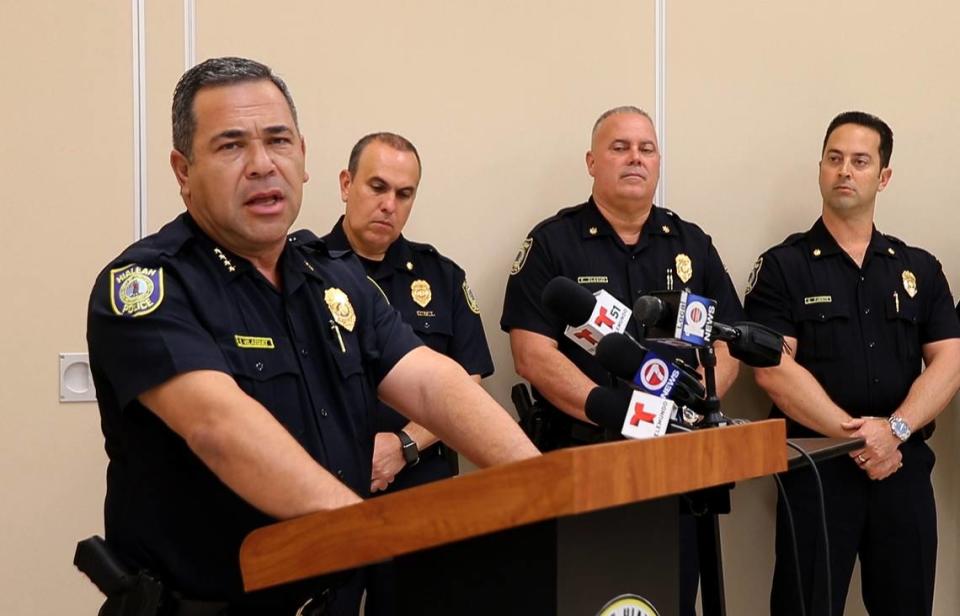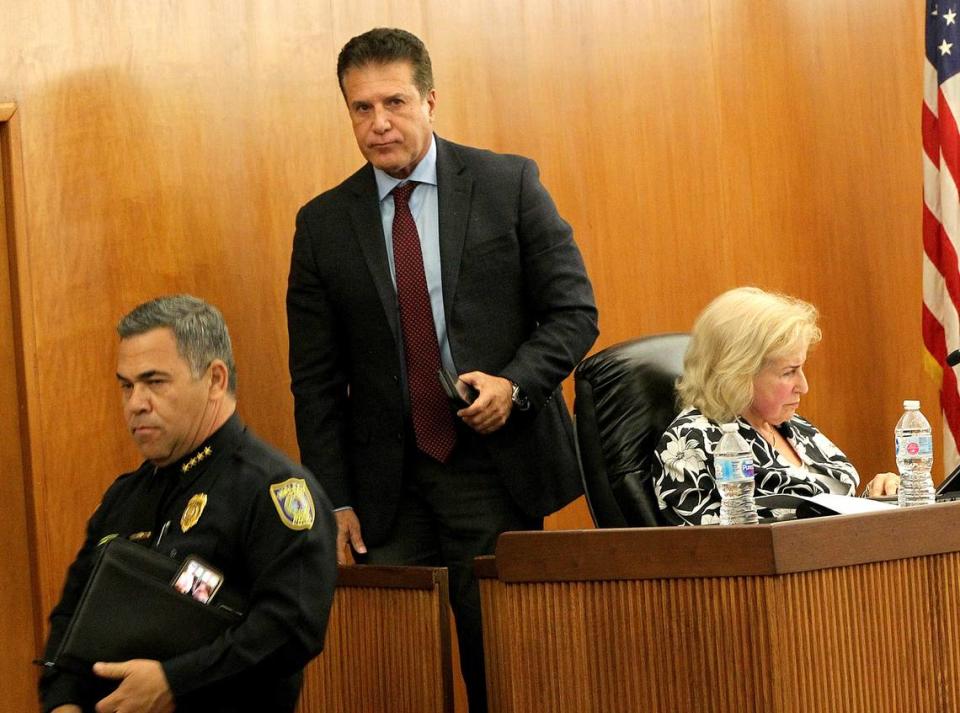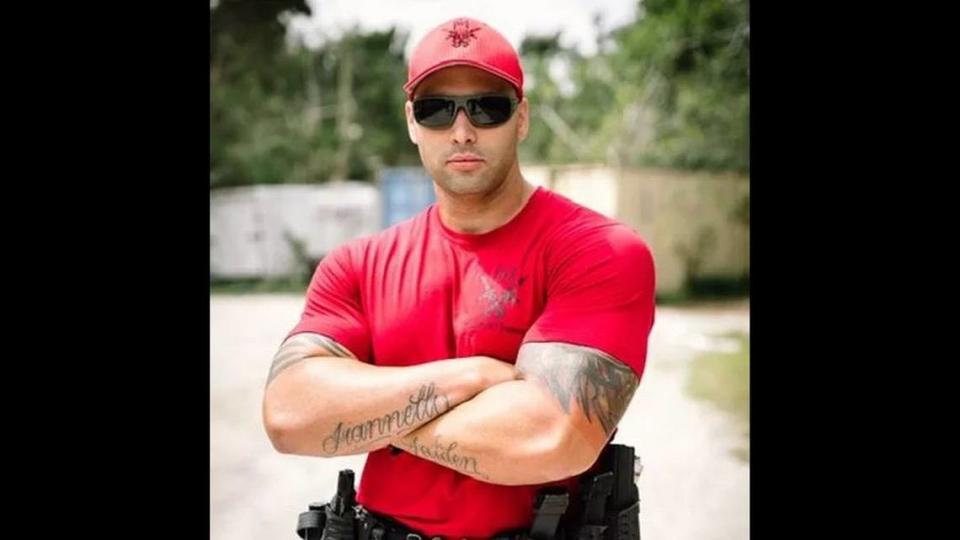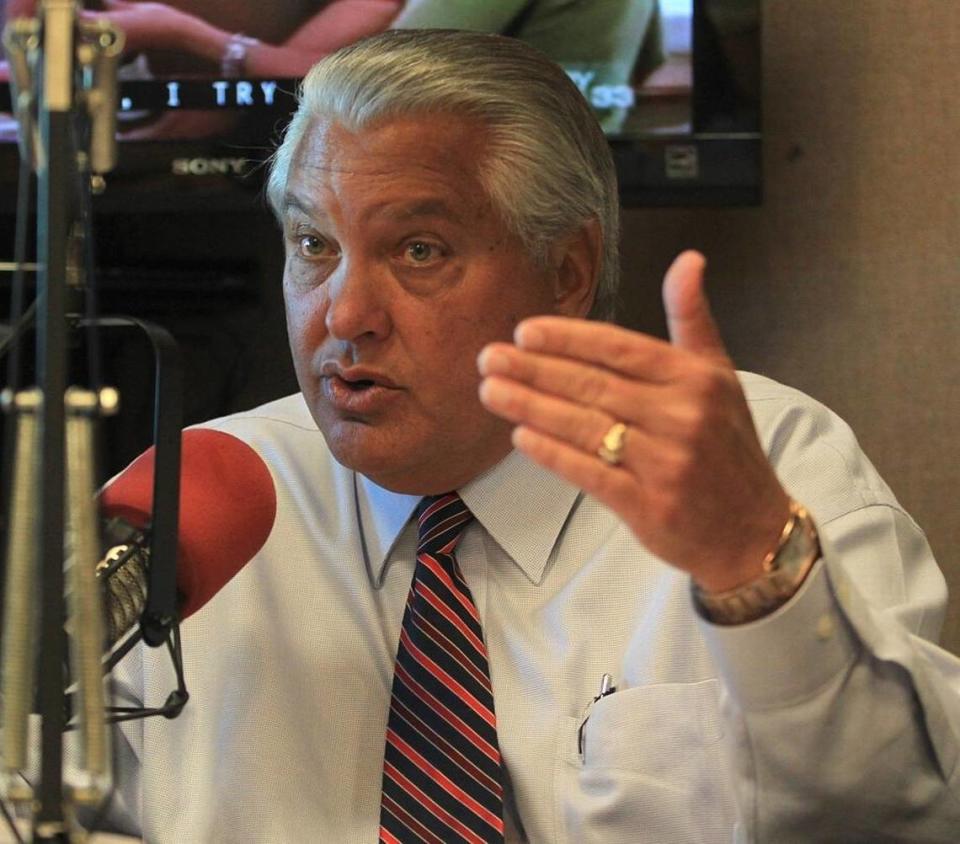‘That guy is a delinquent’: Hialeah police chief had own scandals before sergeant’s arrest
Sergio Velázquez has kept a low-profile since becoming chief of police in Hialeah, Miami-Dade County’s second-largest city, in 2012.
But that changed when FBI agents strode into department headquarters this month to arrest Jesús ‘Jesse’ Menocal Jr, a decorated Hialeah patrol sergeant. The scandal has thrust Velázquez — and his 2016 decision to put Menocal back on the street despite sexual assault allegations made by four women and underage girls — into an unwelcome spotlight.
It has also forced Velázquez to defend not only his handling of Menocal’s case but his overall leadership of the department.
Velázquez, 56, never seemed destined for a role as chief.
After joining Hialeah’s police force in the early 1990s, he committed a string of major disciplinary infractions, according to internal affairs documents obtained by the Miami Herald. Those violations might have normally derailed an ambitious officer’s quest to become top cop.
In one instance, Velázquez’s conduct was found so egregious that he became the subject of a criminal investigation by state prosecutors, leading Hialeah’s police chief at the time to recommend that he be fired.
The incident happened in 2002 when Velázquez, then a sergeant, approached a woman who was being detained at a Hialeah police station for driving under the influence. She had been arrested by an officer under his supervision. Velázquez, on duty at the time, asked for her telephone number. He then began a romantic relationship with the woman, finding her an attorney, paying $1,000 in legal fees, visiting a Santeria reader with her to consult about her case and attending her arraignment in civilian clothes — essentially fighting an arrest made by his own department.
When paperwork from her arrest disappeared from the station, the Miami-Dade State Attorney’s Office opened a criminal investigation into the future chief. But prosecutors could not determine that Velázquez or anyone else had tampered with evidence.
Still, an internal affairs investigation concluded Velázquez behaved improperly. The investigation led the department’s then-chief, Rolando Bolaños, to recommend he should be fired. Only the intervention of the mayor, who instead handed Velázquez a 30-day suspension without pay, kept him on the force.
It wasn’t the first or only time political pull and good fortune would save Velázquez’s career.

Now, former Hialeah mayor Raúl Martínez, who led the city between 1981 and 2005, says not firing Velázquez is one of his greatest regrets.
“I never, ever thought for a second that he would one day become the chief,” Martínez told the Herald in a recent interview. “If he were to leave Hialeah and apply for the police chief’s job in Palatka, I would say that guy is a delinquent.”
Martínez said he suspended Velázquez without pay because he didn’t want to fight the police union. “Your conduct in this case is entirely unacceptable,” Martínez told Velázquez in a May 2004 memo. “Further infractions of this nature will result in termination.”
Just a year later, Velázquez, by then a probationary lieutenant, got into serious trouble again after he was suspected of trumping up battery and cocaine charges in a domestic dispute as an off-duty favor to a family friend, records show. But instead of firing Velázquez, Martínez bumped him back down to sergeant, at the chief’s recommendation.
The demotion didn’t hold back his career for long.
Velázquez had a knack for making rank. He rose up through the department under Martínez’s successor, Julio Robaina, who approved his promotion back to lieutenant in 2007. (Robaina said the internal affairs investigation into the domestic dispute had been flawed.)
And the future chief made an important friend and ally during his time in the ranks: Carlos Hernández, a police commander and city councilman who became Hialeah’s mayor in 2011. Velázquez served with Hernández as a patrol officer and helped him on his political campaigns. In 2012, Hernández appointed his old buddy as chief. Velázquez had previously been the deputy chief.
Neither Velázquez nor Hernández responded to interview requests for this story.
Hialeah has a strong-mayor system where the mayor controls the police department, not a city manager.
“It’s embarrassing that we couldn’t handle the situation with Menocal and now the federal government had to step in,” said Jesus Tundidor, a first-term Hialeah city councilman who beat a candidate backed by Hernández earlier this year. “I think the leadership of the department needs new blood, needs to be asked tough questions.”

Velázquez’s current position reflects a city government with little culture of accountability. Few leaders in Hialeah past and present are free from taint.
Martínez, the mayor who didn’t fire Velázquez? Acquitted of federal corruption charges in the 1990s after three trials. He also saw one of his victories in a mayoral election overturned after absentee ballot fraud. (He won a new election ordered by a judge.)
Bolaños, the ex-chief who allowed Velázquez to keep breaking departmental rules? Both his sons resigned as Hialeah police officers, one after an alleged on-duty beating and another after admitting that he did not disclose an auto-theft arrest when he applied to join the department. One of the sons was later convicted in a bank robbery.
Robaina, the mayor who promoted Velázquez back up the chain of command? He and his wife beat tax evasion and lying charges in federal court after prosecutors said they were operating a “shadow” banking business that offered loans at illegal and exorbitant interest rates. One of their customers was a convicted Ponzi schemer.
And Hernández, the current mayor who made Velázquez chief? The Miami-Dade ethics commission found he lied twice about high-interest loans he gave to the same Ponzi schemer. Hernández showed his contempt for the judgment by trying to pay a $4,000 county fine with 28 buckets full of pennies.
Bolaños and Robaina did not wish to comment.
Kenneth Harms, a former Miami chief of police, said Velázquez’s blemished record revealed a “lack of integrity and willingness to violate the law” — qualities that he said made Velázquez ill-suited to run any police department, let alone one of Hialeah’s size.
“He should have been terminated a long time ago instead of promoted,” Harms said. “Why is the mayor still protecting him?”
‘We don’t cover up’
Velázquez says his tenure as chief has been a success.
Days after the Herald released its investigation on Menocal, the city posted a YouTube video about crime-fighting efforts at the Hialeah Police Department. The video offered a behind-the-scenes look at the department and its resources, and shows Velázquez speaking about a drop in crime since he took over.
“The majority of serious crimes we have in the city are done by people outside the city that come here to commit their crimes,” he said in Spanish.
Under his leadership, the city’s crime rate has fallen roughly 30 percent — nearly identical to the overall decline in crime in Miami-Dade County since 2012.
Before joining the force in Hialeah in 1992, Velázquez worked for the New York City Police Department and Bay Harbor Islands Police Department. By 2007, when he filed for personal bankruptcy, he was making more than $80,000 per year. He was still deep in the hole thanks to mortgage payments, car loans and credit card debt.
His fortunes turned after Hernández made him chief in 2012. Velázquez now makes $182,802, up from $119,596 when he started in that role, according to Hialeah city budgets. That’s a bump of 52 percent. Budgeted salaries for police officers and trainees grew 4 percent over that same time.
Now, after FBI agents arrested Menocal on Dec. 13, Velázquez is coming under the most intense scrutiny of his career.
In 2015, four women said Menocal had sexually assaulted them while on duty. Two were minors, one just 14.
Despite sustaining an internal affairs complaint against Menocal, Velázquez did not discipline him. Instead, the chief returned Menocal to active duty even before state prosecutors decided not to charge him over the sexual assault allegations in the late summer of 2016. Velázquez then gave Menocal a raise and put him back on the SWAT team, records show.
But the Hialeah internal affairs investigation sustained by the chief had uncovered other troubling allegations about Menocal’s behavior as a police officer, allegations that went beyond the scope of the sexual assaults.

When an IA detective interviewed Jairo Escobedo, the boyfriend of one of Menocal’s alleged sexual-assault victims, Escobedo described the sergeant as a menacing bully who used his power not only to enforce the law but break it, too.
In a 2015 sworn statement, Escobedo said that Menocal repeatedly told street-level criminals that if anyone ever “talked about all the crooked shit that he did to them,” the sergeant would beat them up or plant contraband on them and take them to jail. He said Menocal made the pimps trafficking women in his district of Hialeah “snitch for money and drugs.”
He often disparaged other Hialeah cops, according to Escobedo.
“He would tell all the police officers to get the f*** out [of] the area,” Escobedo said. “He would tell other police officers to get the f*** out, to let him run the show. He would call police officers stupid, retarded, dumb f***s.”
“But how do you know this?” the internal affairs detective asked him, according to the not previously reported interview.
“Because it was done in front of my face at one point in time,” said Escobedo, who is now on probation after a 2017 conviction for marijuana dealing and has a long track record of arrests.
Escobedo also claimed that Menocal hunted down prostitutes as he patrolled the city, pressuring them to have sex and do drugs with him. Sometimes he gave them money, Escobedo said.
“He would tell them, ‘Yo, you want to f***? ... I got money. ... You don’t need to be out in these streets. ... F*** your boyfriend. ... He’s a p***y’ ” Escobedo said. ” ‘Look, I’m a cop. I’m a sergeant. I got power.’ ”
“Everybody looks at the sergeant as a big pervert in the neighborhood on West 24 Avenue,” he added.
One of the alleged victims was Escobedo’s girlfriend. She was in her early 20s when Menocal is accused of sexually assaulting her sometime between January and March 2015, according to a federal indictment alleging that the law enforcement officer violated her civil rights, as well as those of a second woman.
“She was approached by Sergeant Menocal and forced into Sergeant Menocal’s car,” Escobedo recalled. “The truck, the police truck, that says Sergeant on the side.”
Escobedo said Menocal took his girlfriend to a warehouse area in Hialeah. According to Escobedo, the sergeant told her: “This is where I take my bitches and f*** ‘em. And my [girlfriend] stated to me that Sergeant Menocal forced — forcefully kissed her and forcefully made her touch — made her touch his genitals.
“And I don’t know no more of the incident, because my [girlfriend] is reluctant to talk about it with me,” he added. “She breaks down every time I bring it up.”
Menocal, who was fired after his arrest, has pleaded not guilty.
“Jairo Escobedo has zero credibility,” Menocal’s attorney, Michael Grieco, said in an email. “He has been arrested 26 times (many involving Sgt. Menocal), is a 9-time convicted felon, is currently on probation for selling drugs near a school, and was twice charged in 2016 with beating up the same girlfriend he speaks of in his IA statement.”
Velázquez says Menocal’s alleged misconduct does not reflect poorly on his leadership or the performance of his department.
At a November news conference in response to the Herald’s first story on Menocal, the chief defended his actions, saying he could not punish Menocal while the FBI was investigating. Policing experts and department sources have disputed that claim.
Records show Velázquez put Menocal on a desk after the initial allegations were made in June 2015 but returned him to the street in 2016 — and then kept him on active duty well into 2019, even though the FBI had been investigating the sergeant for two years by that point. (On Aug. 8, 2017, FBI agents interviewed family members of an alleged victim who had died when she fell or jumped from a moving car, according to a document obtained by the Herald.) The chief returned Menocal to a desk earlier this year, saying only that new information had been discovered.
“I want the public to know: Do not worry. We don’t cover up for officers,” Velázquez said.
Meanwhile, the city of Hialeah has still not made Velázquez’s personnel or internal affairs files available to the Herald in response to public records requests dated Nov. 14. Reporters were able to obtain some of his internal affairs record from city sources. Velázquez’s department has been criticized for a lack of transparency in other cases, including two fatal car crashes involving Hialeah police.
The city has also moved slowly in response to other public records requests from the Herald about Menocal and Velázquez.
On Nov. 19, the city clerk’s office told reporters it would take three hours of work to review and redact certain emails sent or received by Velázquez and the mayor. More than a month later, the Herald is still waiting for the documents. It also took more than a month for the city to release internal affairs records relating to the sexual assault allegations against Menocal. The Herald obtained those records independently.
“All of this information should be available,” said Harms, the former Miami chief. “It’s a disservice to the community. They are trying to cover this up.”
Hialeah police spokesman Lt. Eddie Rodriguez even refused to confirm to the Herald how much Velázquez makes in taxpayer-funded salary. When a reporter approached Rodriguez after a news conference to ask why he was failing to return phone calls or provide basic information, Rodriguez laughed and said he wanted to help but the chief wouldn’t allow him to answer questions.
Police lieutenants in Hialeah make an average of $105,000, according to the city budget.
The city has not yet released Rodriguez’s individual salary in response to a Nov. 20 records request.
‘Sergio, a civilian’
Dating a suspect arrested by his officers wasn’t the only questionable decision Velázquez made before becoming chief, his internal affairs file shows.
During a 2005 incident, internal affairs investigators found that Velázquez, then a lieutenant, had improperly intervened during a fight involving family friends and ordered an unlawful arrest — and then lied about his conduct and refused to provide evidence to investigators.
On May 16, 2005, officers Jorge Castillo and Luis Garrido responded to a disturbance call at a home in Hialeah. A fight had broken out between a man named Francisco Lopez and his stepdaughter’s boyfriend, Jose Acosta. Lopez would later say that Acosta had pulled a machete out of his car and waved it at him.
After the officers responded, Lopez called Velázquez, who was off duty at the time and arrived at the house in plain clothes. Velázquez often visited and ate meals at the house. Lopez claimed that a small bag of cocaine had fallen out of Acosta’s pocket while they fought, although there were no witnesses to the alleged incident. Lopez did not mention anything about the drugs until 20 minutes after the two officers arrived. He said he found the baggie on the ground while walking with Velázquez.
Velázquez ordered the officers to arrest Acosta on battery and cocaine possession charges, according to an internal affairs report. Within an hour, he had changed his mind, releasing Acosta at the urging of Lopez’s stepdaughter, Cathy Bacallao, who was dating Acosta, according to the IA report.
One of the officers reported his concerns over what he called an “inappropriate” arrest to superiors. But Velázquez claimed the officers were lying about being ordered to arrest Acosta and that they had acted on their own authority. He said he had responded to the scene as “Sergio, a civilian,” not as a police lieutenant.
But an internal affairs detective found that Velázquez had “involved himself in a scene of a criminal investigation while off duty, having a personal interest in the outcome of the investigation, which involved personal friends.” The detective also noted that Velázquez refused to provide his cellphone and SunPass toll records and had “thus interfered with an internal affairs investigation.”
Finally, the investigation revealed that a police report documenting the impounding of the cocaine had vanished — not the first time that had happened in a case involving Velázquez. “It is a fact there have been other reports which have become missing in status .... when Lieutenant Velázquez has been the subject officer under investigation,” the IA probe noted.
After sustaining the internal affairs complaint, then-Police Chief Rolando Bolaños recommended that Velázquez be demoted to sergeant. Raúl Martínez, the mayor at the time, agreed. Velázquez lost his title as lieutenant and higher pay.
But two years later, Hialeah police re-evaluated the initial internal affairs report — at Velázquez’s request — and found “certain questions of credibility” concerning the two officers involved in Acosta’s 2005 arrest, according to a memo between Bolaños and Julio Robaina, Martínez’s successor as mayor. As a result, Robaina reinstated Velázquez to lieutenant. (The city has not provided the Herald with a copy of the internal affairs re-evaluation, which was requested Dec. 3.)

Velázquez had been on internal affairs’ radar even earlier.
On June 7, 1999, Velázquez, then a sergeant, left his post in his patrol car without authorization, investigators found. The reason? He wanted to go to Miami Beach to help his wife obtain a refund from a travel agency.
Velázquez was away from his job as a zone supervisor for more than three hours to take care of personal business.
Upon arriving at the travel agency, Velázquez and a Miami Beach police officer — both wearing their uniforms — entered the store. Velázquez claimed his wife’s credit card was used by the Collins Avenue agency to pay for a trip without her permission, according to an internal affairs report.
The owner of New Age 2 Travel told investigators she believed the two officers were using their uniforms to intimidate her to obtain the refund, but said they did not threaten her. Investigators concluded Velázquez was not using his badge to extort a refund, but they did find that he fatariled to obtain the required permission of a patrol shift commander to leave his post.
As a result, the chief recommended suspending Velázquez for 20 hours.
A warning letter was placed in his file.
Miami Herald writer Christina Morales and Miami Herald researcher Monika Leal contributed to this report.

